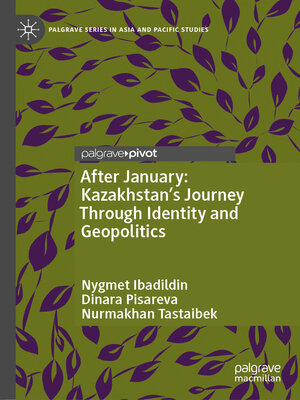After January
ebook ∣ Kazakhstan's Journey Through Identity and Geopolitics · Palgrave Series in Asia and Pacific Studies
By Nygmet Ibadildin

Sign up to save your library
With an OverDrive account, you can save your favorite libraries for at-a-glance information about availability. Find out more about OverDrive accounts.
Find this title in Libby, the library reading app by OverDrive.



Search for a digital library with this title
Title found at these libraries:
| Library Name | Distance |
|---|---|
| Loading... |
This book explores how Kazakhstan has navigated its identity and geopolitical relationships since the January 2022 protests and the Russian-Ukrainian crisis. What began as a study of Soviet legacy in Kazakhstan shifted focus when major events in 2022 altered the country's internal politics and regional standing.
We trace Kazakhstan's complex history with Russia from the incorporation of Kazakh nomadic territories into the Russian Empire through the Soviet era to today's complex relationship. The Soviet policies of collectivization and sedentarization dramatically transformed traditional Kazakh society, with devastating consequences like the Asharshylyk famine that continue to shape national memory and identity.
The book examines Kazakhstan's development under Presidents Nazarbayev and Tokayev, looking at how their "social contract" prioritized economic growth and stability over political freedoms. We provide a detailed look at the January 2022 protests, their aftermath, and Tokayev's subsequent reform agenda aimed at political modernization.
In the shadow of the Russian-Ukrainian crisis, we show how Kazakhstan walks a diplomatic tightrope—maintaining necessary ties with Russia while avoiding Western sanctions and developing new partnerships, especially with Turkic states. Using postcolonial theory, we analyze how historical power dynamics continue to influence Kazakhstan's search for identity and place in the world.
Through five chapters, we offer readers a window into Kazakhstan's evolving sense of self, its changing relationships with global powers, and the potential for Pan-Turkism to provide a complementary alliance to Russian-dominated regional frameworks.







